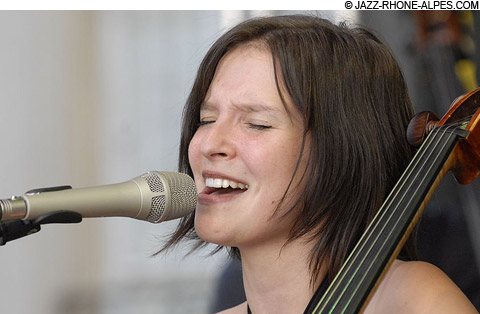
TRIPLE THREAT Singer/cellist Anne Sila makes her Boston debut with trumpeter Lew Soloff and bassist François Moutin. |
A concert by the veteran trumpeter Lew Soloff and the bass virtuoso François Moutin would be reason enough to hit the Coolidge Corner on September 26. But in this case it's a chance to hear not only these two distinguished artists but also a startlingly talented newcomer, the cellist and singer Anne Sila. And, oh yeah, there will also be video and live dance.Soloff, now 67, has a long list of impressive credits that includes the Carla Bley Band, the Carnegie Hall Big Band, the Vanguard Jazz Orchestra, a passel of Latin jazz bands (including Machito's), seminal jazz-rock outfit Blood, Sweat, and Tears, and a long association with the man he considers his mentor, composer/arranger Gil Evans. The Paris-born Moutin, 49, for years has led the Moutin Reunion Quartet with his twin brother, drummer Louis, but has, since moving to New York in the late '90s, become as busy as Soloff. What both players share — aside from impeccable technique — is the ability to contribute not just chops, but conviction in just about any context, from straightahead to avant-garde.
"Francois can change," Soloff tells me over the phone from New York. "He can be very free and intellectual and soloistic but also very emotional, and when he plays that straight four-four grooving bass, he's reminiscent of Paul Chambers." The latter being just one of the jazz gods Soloff has played with.
Moutin discovered Sila at a jazz festival last year in France, where he and his brother were conducting master classes at the local conservatory. "This young girl shows up and says, 'I want to sing,' " Moutin tells me in a separate phone conversation. "Usually jazz musicians are wary of female jazz singers because . . . well, they're more singers than they are musicians, if you know what I mean."
But Sila was different. "She starts singing and Louis and I look at each other, like, 'What?!' From the first bar, we can feel she's more of a musician." He was equally impressed when he caught Sila's duo set with a guitarist at the festival the next day. She was 20 at the time.
Sila took Moutin's email address and, months later, showed up in New York. They began working as a duo, and then with Soloff.
Sila's first instrument at the conservatory was cello, with secondary studies in dance. But she had been working on her singing, and on playing cello simultaneously with her vocals. The trio have recorded an as-yet unreleased CD, but on the two tracks that Moutin was able to share with me, you can hear their promise — and especially that of Sila. One tune is the old Cy Coleman standard "Why Try to Change Me Now," which Sila picked up off a Fiona Apple record. It begins with flamenco-like flourishes and sliding tones from Moutin, and then Sila enters: "I'm sentimental/so I walk in the rain/I've got some habits even I can't explain./Go to the corner/end up in Spain./Why try to change me now?" The delicacy of her vibratoless phrasing is spot on, and Soloff's muted obligatos contribute to a riveting three-way conversation. The group's take on Monk's "Evidence" is a headlong adventure, beginning with free improv on the changes, fast-break scatting from Sila, and a slam-bang unison out-chorus. Each track has a distinctive chamber jazz (i.e., drummerless) intimacy.